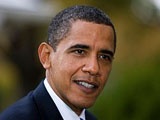|
|
TODAY.AZ / World news
Relationship with Turkey 'more important than ever,' US president says
20 December 2010 [11:45] - TODAY.AZ
 The relationship between Turkey and the United States remains strong and is “more important than ever” in the wake of leaked U.S. diplomatic cables critical of some officials in Ankara, the U.S. president has said.
The relationship between Turkey and the United States remains strong and is “more important than ever” in the wake of leaked U.S. diplomatic cables critical of some officials in Ankara, the U.S. president has said.Following a recent conversation with the Turkish prime minister, U.S. President Barack Obama told daily Hürriyet in an e-mail interview that the two leaders had “reaffirmed the strong state of U.S.-Turkish relations” despite some differences “from time to time.”
“Our partnership is resilient, and we agreed that the irresponsible acts of WikiLeaks do not threaten it,” Obama said in the interview, which was published by Hürriyet on Sunday. “Given the increasingly complex challenges the world faces, I believe that U.S.-Turkish cooperation is more important now than ever.”
In the interview, Obama, who traveled to Turkey in April 2009 in one of his first trips abroad as head of state, addressed many of the most important issues facing the country, including its European Union accession bid; its diplomatic relations with Israel and the West; and its internal dealings with its Kurdish population and its religious minorities.
While reiterating his country’s support for Turkey’s fight against the outlawed Kurdistan Workers’ Party, or PKK, the U.S. president hailed the Turkish government for its moves to improve the “human rights and economic situation for Kurds,” including loosening restrictions on teaching Kurdish and on public and private broadcasting in the language.
“We have also underscored that the solution to the PKK is not military alone, but must be in tandem with efforts to improve the human rights and standards of living of all of Turkey’s citizens,” Obama said. “These are the types of steps that, if sustained and broadened over time, will diminish the appeal and strength of the PKK.”
The PKK has been listed as a terrorist organization by Turkey, the United States and the EU.
In the interview, Obama also reiterated a call he made in his April 2009 speech to the Turkish Parliament, asking the government to reopen the Halki Seminary “as a symbol of [its] commitment to religious freedom.” The Greek Orthodox seminary, located on the Princes’ Islands off Istanbul, was formerly a key center of theological education but has been closed since 1971.
Responding to a question about the ongoing diplomatic chill between Turkey and Israel, Obama encouraged the two U.S. regional allies to “find an acceptable way forward” and “do everything they can to repair their relations,” while applauding Turkish Prime Minister Recep Tayyip Erdoğan’s decision to send Turkish aircraft to assist the Israeli government in battling devastating forest fires earlier this month.
Obama also addressed speculation that Turkey’s vote in June opposing a new round of United Nations Security Council sanctions against Iran indicated that Ankara was shifting its foreign policy toward the Middle East and away from the West.
“Turkey has pursued an active foreign policy that has seen it interacting more intensively than ever with countries all across its neighborhood and beyond,” Obama said. “I recognize this important emerging role for Turkey.”
Suggesting the controversy over the Iran vote stemmed from a “difference about tactics,” the U.S. president expressed his confidence that Turkey “shares the goal of preventing a nuclear-armed Iran.”
In the interview, Obama also reiterated U.S. support for Turkish accession to the EU and urged Ankara “to continue the reforms necessary to complete the membership process.”
“I remain convinced that a Turkey that meets EU membership criteria would be good for the EU and that Turkey’s efforts to meet those criteria is good for Turkey,” the U.S. president said. “Europe gains by the diversity of ethnicity, tradition and faith – it is not diminished by it. And Turkish membership in the EU would broaden and strengthen Europe’s foundation once more.”
/Hurriyet Daily News/
URL: http://www.today.az/news/regions/78430.html
 Print version
Print version
Views: 2064
Connect with us. Get latest news and updates.
See Also
- 01 December 2025 [20:50]
Turkiye cancels restaurant fees - 01 December 2025 [19:48]
Seat belts abolished in European country - 01 December 2025 [11:02]
Lukashenko’s low-profile Oman trip fuels disappearance rumors - 01 December 2025 [09:00]
Raphinha sets up 2, Olmo scores double as Barcelona rebounds back from Chelsea defeat - 01 December 2025 [08:00]
Andijan chosen to serve as Turkic World’s Cultural Capital for 2026 - 30 November 2025 [23:00]
Hong Kong declares 3 days of mourning after deadly Tai Po fire - 30 November 2025 [19:59]
Confused narratives from Tehran reveal its strategic anxiety [OPINION] - 30 November 2025 [12:24]
More than 518,000 citizens already voted in Kyrgyzstan's parliamentary elections - 30 November 2025 [11:21]
Armenian, Turkish officials discuss TRIPP project - 30 November 2025 [09:00]
Massive protests disrupt far-right AfD Youth Wing Conference in Giessen, Germany
Most Popular
 Lachin hosts closing ceremony of CIS Capital of Culture 2025
Lachin hosts closing ceremony of CIS Capital of Culture 2025
 Azerbaijan, Thailand discuss partnership across multiple sectors
Azerbaijan, Thailand discuss partnership across multiple sectors
 Armenia’s strategic pivot: Why Yerevan quietly embracing TRIPP Corridor [ANALYSIS]
Armenia’s strategic pivot: Why Yerevan quietly embracing TRIPP Corridor [ANALYSIS]
 Azerbaijani artists take center stage at World Culture Festival in Karachi
Azerbaijani artists take center stage at World Culture Festival in Karachi
 Azerbaijan, China central banks explore closer cooperation
Azerbaijan, China central banks explore closer cooperation
 Armenian, Turkish officials discuss TRIPP project
Armenian, Turkish officials discuss TRIPP project
 Massive protests disrupt far-right AfD Youth Wing Conference in Giessen, Germany
Massive protests disrupt far-right AfD Youth Wing Conference in Giessen, Germany
